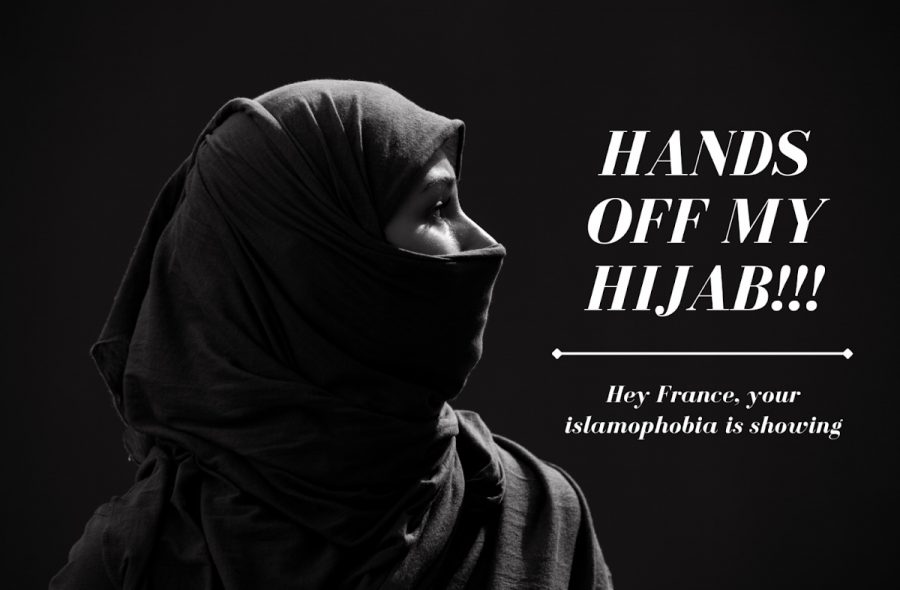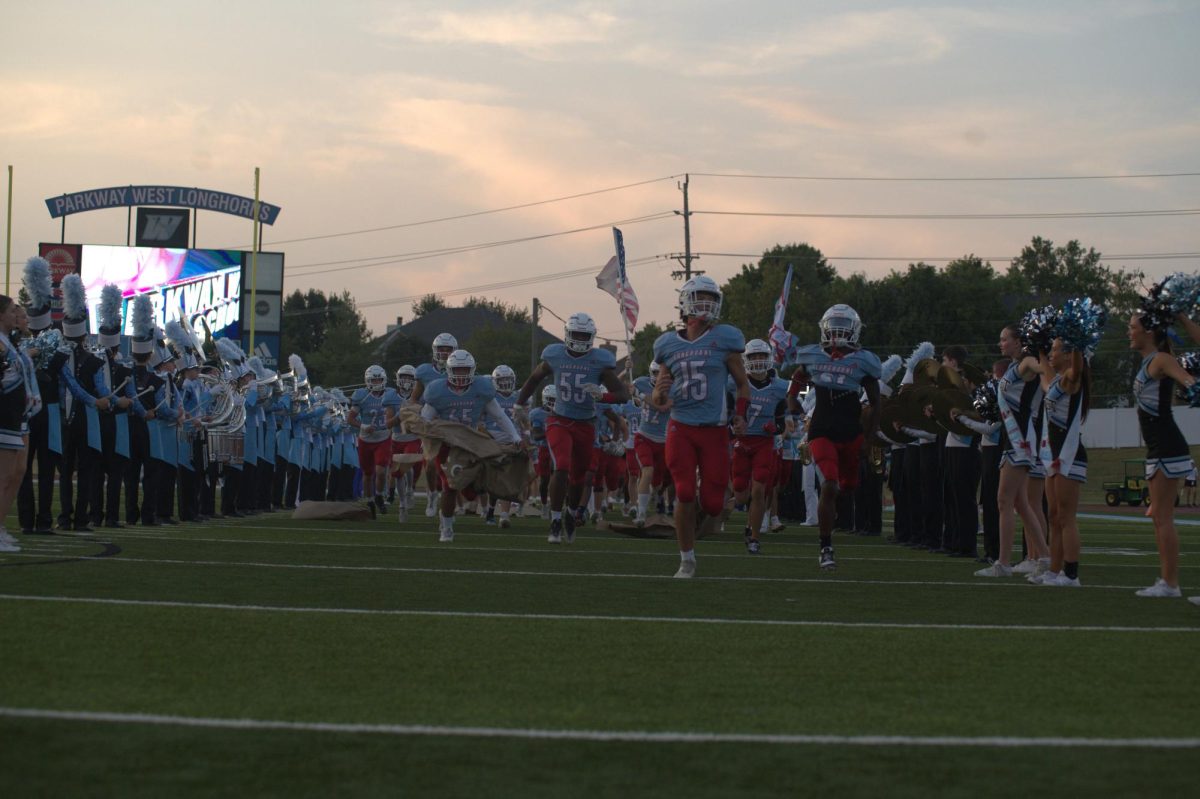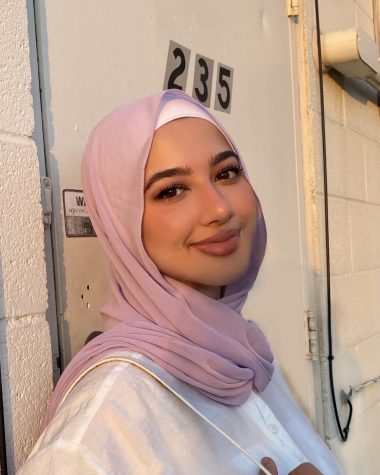When three middle school girls refused to remove their headdresses in France in 1989 while at school, the government intervened, banning hijabs in public school. After three decades, France has continued to discuss the appearance of women, singling out an astounding number of controversial actions regarding Muslim women, and their ŌĆ£audacityŌĆØ to cover in public. A new law was proposed on March 30, banning minors from donning any religious symbols or clothing. As a young Muslim woman, this made me question my identity. I believe itŌĆÖs important for not only Muslim women, but everyone as a whole, to participate in the fight for religious freedom, and the womanŌĆÖs right to dress as she pleases.┬Ā
The law in France┬Ā
On March 30, the French Senate passed a measure that would ŌĆ£prohibit in the public space of any conspicuous religious sign by minors and of any dress or clothing which would signify an interiorization of women over men,ŌĆØ which essentially places a ban on hijabs for those under the age of 18. They also proposed a ban that would prohibit hijabi mothers from attending their childrenŌĆÖs school field trips. These are amendments to a law that the government introduced to address religious extremism. While the hijab ban has not been legally amended by the National Assembly, and may never be, it still brings me to question the rampant enforced assimilation and Islamophobia in not only France but our world as a whole.┬Ā
France has strived in maintaining a secularist view of governance, often arguing that religious symbols are in opposition to European values. With French lawmakers stepping forward in revoking a womenŌĆÖs choice to cover, it moves us as a world many steps back in the fight for womenŌĆÖs rights as well as freedom from suppression. France as a country has actively enabled Islamophobia, and despite being the epicenter of culture, fashion, and art I saw people who attend French shows, support their brands, and admire their culture openly oppose the ruling.
My experience┬Ā
While this law may only directly affect Muslim women in France, it leaves a significant impact on the world around us, including me. Muslim students at Parkway West are free to wear the hijab while attending school. As a Muslim student in this district, it disheartened me to read about the rising political debate in France. Not only did I feel for my Muslim sisters, but it also concerned me of my freedom to embrace my own identity. I felt like I needed to do something, and searched for ways to fight back this oppressive ruling, even if IŌĆÖm thousands of miles away.┬Ā
As the ban began to flood social media outlets like Twitter, Facebook, and Instagram, I found myself scouring the web searching for support from known names in the media. Messages from famous athletes, actors, and politicians poured into my feed, and the media seemed like it was finally on our side, contrary to the typical negative displays of Muslims in the media.
Coming from a Muslim family, the women in my household have all chosen to wear the hijab, and I look up to them in their ability to not conform to societal standards of fashion and beauty. All around me are Muslim women who don the headscarf, whether itŌĆÖs my grandma, mom, sisters or aunts ŌĆö all generations come together in representing our religion. I quickly realized that this was what I was searching for. In reality, there wasnŌĆÖt much I could do to actively fight against France’s ruling. But by making that choice to wear the hijab in a world where many will not accept it, I could stand in solidarity with my fellow Muslim sisters in France. Not only is the hijab a religious requirement, but itŌĆÖs also a statement. It shows the world that we are proud of our religion and that it intertwines into our identity ŌĆö and thatŌĆÖs exactly what I wanted to do. On April 5, I officially started wearing the hijab.┬Ā
The danger of such laws
IŌĆÖm only one person in a world of billions, and this is only how IŌĆÖve been personally affected. Despite my actions, this law may still pass, and Muslim women in France are having their identities suppressed. Implementing such laws is dangerous to our society, and by trying to cleanse the country of any traces of Islam, it may inspire other individuals and countries to follow in their footsteps. When the government comes to hold this much power in oppressing its civilians, it creates a safe environment for those who want to legitimize Islamophobia in their own government. As of today, European nations like Germany, Austria, the Netherlands, Russia, Italy, and Spain have imposed a hijab ban, or at least tried to within the last decade.
In a continent like Europe that is most known for its colonialism and efforts to dominate foreign countries, they have a multitude of refugees inhabiting their nations, specifically Muslim refugees. As we see a rise in humanitarian crises in majority Muslim regions, like in the Middle East, an influx of refugees have escaped to Europe. They come in vast numbers in an effort to seek asylum from their war-torn conditions, only to be accepted, then stabbed in the back by anti-Islamic laws. Laws like these force them to conform to society and abandon their identities. When we begin to morph into a society equal in image, we lose that aspect of diversity, identity and religious or cultural traditions become unlawful, which may only lead to even more tension among minority groups. France is a diaspora home to people from all around the world, and when it is made lawfully OK to suppress them, that may give the go-ahead for French citizens to partake in prejudice.┬Ā
What this means for me/America
In a country like America, we see a major contrast in the way we govern society. We have amended laws in place guaranteeing our right to religious freedom and the right to express ourselves however we want. As a hijabi woman now, I donŌĆÖt see our country following in FranceŌĆÖs footsteps legally. However, that doesnŌĆÖt diminish the fact that Islamophobia is common in our nation. Growing up in this country, IŌĆÖve witnessed the media, the public and people close to me practice Islamophobia ŌĆö and seeing this makes me question our world’s future. FranceŌĆÖs ruling only reveals how common anti-Islamic beliefs are despite how accepting this world may seem. As a hijabi living in the Midwest, I too am at risk of potential attacks against me, especially now that I am visibly Muslim.┬Ā
Moving forward, I hope this news helps people understand how discrimination still plays a major role in our world, and that the global fight against Islamophobia is not over yet. I encourage everyone to simply learn about the true values of Islam, and specifically why Muslim women around the world choose to cover. I believe having strong, knowledgeable allies is where we can begin our movement: allies of all religions, races, and backgrounds. Even by just visiting our local Ballwin mosque Dar Al-Salam, you can be introduced to our small, but loving communityŌĆō a community ready to welcome you with open arms. Only by confronting Islamophobia on an individual and community basis, can we truly help our Muslim sisters in France and all over the world.┬Ā




![Gazing up from the stage, junior Joseph McCurdy who played Peter Pan in the school play, Lost Girl, sits next to senior Juliana Rogers, who plays Wendy Darling, during a theater rehearsal. McCurdyŌĆÖs passion for theater began when he observed a West High production in middle school. ŌĆ£I've been in the high school theater program since I was a freshman. I've always loved theater, but [what prompted me to join] was [when] I went to see [a performance here] when I was in middle school, and it was super cool,ŌĆØ McCurdy said.](https://pwestpathfinder.com/wp-content/uploads/2025/11/IMG_6535-1200x798.jpeg)

![Standing tall, stacked in a precise formation, the cheer team strikes a signature pose during halftime on Sept. 12 at the varsity football game. Nearly a month after this performance, the cheer team performed at the Missouri Cheerleading Coaches Association (MCCA) regional competition on Oct. 4, 2025. ŌĆ£We've all come [to] work together a lot more,ŌĆØ sophomore Elyssa Philippi said. ŌĆ£We're a lot closer than we were [earlier in the season] and going to state has made us closer [in] trying to work with each other, learn [new] skills and make our team better.ŌĆØ](https://pwestpathfinder.com/wp-content/uploads/2025/11/DSC5139-1.jpg)
![Handing out candy to excited trunk-or-treaters, President of the United Nations ChildrenŌĆÖs Fund club and junior Sara Ashok represents that group. Ashok was eager to participate in this event for multiple reasons. ŌĆ£I really wanted to be a part of the event because I get to help create memories for kids and spend time with my friends, spreading the things [I'm passionate about],ŌĆØ Ashok said.](https://pwestpathfinder.com/wp-content/uploads/2025/11/DSC_8648-1-1200x800.jpg)

![Smiling in a sea of Longhorns, Fox 2 reporter Ty Hawkins joins junior Darren Young during the morning Oct. 3 pep rally. The last time West was featured in this segment was 2011. ŌĆ£[I hope people see this and think] if you come to [Parkway] West, you will have the time of your life because there are so many fun activities to do that make it feel like you belong here. I was surprised so many people attended, but it was a lot of fun,ŌĆØ Young said.](https://pwestpathfinder.com/wp-content/uploads/2025/10/Edited2-1200x798.jpg)
![West High seniors and families listen as a representative of The Scholarship Foundation of St. Louis, Teresa Steinkamp, leads a Free Application for Federal Student Aid (FAFSA) workshop. This session, held in the library, provided guidance on financial aid, scholarships and student loan options. ŌĆ£This event is very beneficial for any seniors who are applying to or considering applying to colleges after high school [because] the cost of college is on the rise for seniors and parents,ŌĆØ college and career counselor Chris Lorenz said.](https://pwestpathfinder.com/wp-content/uploads/2025/09/DSC_4478-1200x778.jpg)
![Senior Kamori Berry walks across the field during halftime at the Homecoming football game on Sept. 12. During the pep assembly earlier that day, she was pronounced Homecoming Queen. ŌĆ£I thought it was nice that the crowd [started] cheering right away. I know [my friends] were really excited for me, and my family was happy because typically non-white people don't win,ŌĆØ Berry said.](https://pwestpathfinder.com/wp-content/uploads/2025/09/DSC7046-Enhanced-NR-1200x798.jpg)


![Sitting courtside before a junior varsity girlsŌĆÖ tennis match, senior Tanisi Saha rushes to finish her homework. Saha has found herself doing academic work during her athletic activities since her freshman year. ŌĆ£Being in sports has taught me how to stay organized and on top of my schoolwork. [With] a busy practice and game schedule, IŌĆÖve learned to manage my homework and study time better,ŌĆØ Saha said.](https://pwestpathfinder.com/wp-content/uploads/2025/11/DSC_0022-1200x800.jpg)
![Sophomore Maryem Hidic signs up for an academic lab through Infinite Campus, a grading and scheduling software. Some students enjoyed selecting their responsive schedule in a method that was used school-wide last year. ŌĆ£I think it's more inconvenient now, because I can't change [my classes] the day of, if I have a big test coming and I forget about it, I can't change [my class],ŌĆØ sophomore Alisha Singh said.](https://pwestpathfinder.com/wp-content/uploads/2025/10/DSC_0012-1200x801.jpg)
![Senior Dhiya Prasanna examines a bottle of Tylenol. Prasanna has observed data in science labs and in real life. ŌĆ£[I] advise the public not to just look or search for information that supports your argument, but search for information that doesn't support it,ŌĆØ Prasanna said.](https://pwestpathfinder.com/wp-content/uploads/2025/10/DSC_0073-2-1200x800.jpg)
![Junior Fiona Dye lifts weights in Strength and Conditioning. Now that the Trump administration has instituted policies such as AI deregulation, tariffs and university funding freezes, women may have to work twice as hard to get half as far. "[Trump] wants America to be more divided; he wants to inspire hatred in people,ŌĆØ feminist club member and junior Clara Lazarini said.](https://pwestpathfinder.com/wp-content/uploads/2025/05/Flag.png)
![As the Trump administration cracks down on immigration, it scapegoats many immigrants for the United StatesŌĆÖ plights, precipitating a possible genocide. Sophomore Annabella Whiteley moved from the United Kingdom when she was eight. ŌĆ£ItŌĆÖs pretty scary because IŌĆÖm on a visa. When my visa expires next year, IŌĆÖm not sure whatŌĆÖs going to happen, especially with [immigration] policies up in the air, so it is a concern for my family,ŌĆØ Whiteley said.](https://pwestpathfinder.com/wp-content/uploads/2025/05/DSC_0077-7copy.jpg)
![Shifting global trade, President Donald TrumpŌĆÖs tariffs are raising concerns about economic stability for the U.S. and other countries alike. ŌĆ£[The tariffs are] going to pose a distinct challenge to the U.S. economy and a challenge to the global economy on the whole because it's going to greatly upset who trades with who and where resources and products are going to come from,ŌĆØ social studies teacher Melvin Trotier said.](https://pwestpathfinder.com/wp-content/uploads/2025/05/MDB_3456-1200x800.jpg)



![Some of the most deadly instances of gun violence have occurred in schools, communities and other ŌĆśsafe spacesŌĆÖ for students. These uncontrolled settings give way to the need for gun regulation, including background and mental health checks. ŌĆ£Gun control comes about with more laws, but there are a lot of guns out there that people could obtain illegally. What is a solution that would get the illegal guns off the street? We have yet to find [one],ŌĆØ social studies teacher Nancy Sachtlaben said.](https://pwestpathfinder.com/wp-content/uploads/2025/01/DSC_5122-1200x800.jpg)

![Sophomore Shree Sikkal Kumar serves the ball across the court in a match against Lindbergh. Sikkal Kumar has been a varsity member of the varsity girlsŌĆÖ tennis team for two years, helping her earn the number two rank in Class 2 District 2.ŌĆ£When matches are close, itŌĆÖs easy to get nervous, but I [ground] myself by[staying] confident and ready to play,ŌĆØ Sikkal Kumar said.](https://pwestpathfinder.com/wp-content/uploads/2025/11/DSC2801-1200x798.jpg)
![Dressed up as the varsity girlsŌĆÖ tennis coach Katelyn Arenos, senior Kate Johnson and junior Mireya David hand out candy at West HighŌĆÖs annual trunk or treat event. This year, the trunk or treat was moved inside as a result of adverse weather. ŌĆ£As a senior, I care less about Halloween now. Teachers will bring their kids and families [to WestŌĆÖs Trunk or Treat], but there were fewer [this year] because they just thought it was canceled [due to the] rain. [With] Halloween, I think you care less the older you get,ŌĆØ Johnson said.](https://pwestpathfinder.com/wp-content/uploads/2025/10/DSC00892-1-1200x800.jpg)
![Focused on providing exceptional service, sophomore Darsh Mahapatra carefully cleans the door of a customerŌĆÖs car. Mahapatra has always believed his customers deserve nothing less than the best. ŌĆ£[If] theyŌĆÖre trusting us with their car and our service, then I am convinced that they deserve our 100 percent effort and beyond,ŌĆØ Mahapatra said.](https://pwestpathfinder.com/wp-content/uploads/2025/10/DSC_0018-1200x800.jpg)
![Sophomore Aleix Pi de Cabanyes Navarro (left) finishes up a soccer game while junior Ava Muench (right) warms up for cross country practice. The two came to Parkway West High School as exchange students for the 2025-2026 school year. ŌĆ£The goal for the [exchange] program is to provide opportunities for both Parkway students and our international exchange students to learn about other cultures, build connections and become confident, capable, curious and caring ŌĆö ParkwayŌĆÖs Four CŌĆÖs ŌĆö in the process,ŌĆØ Exchange Program Lead Lauren Farrelly said.](https://pwestpathfinder.com/wp-content/uploads/2025/10/Feature-Photo-1200x800.png)
![Leaning on the podium, superintendent Melissa Schneider speaks to Parkway journalism students during a press conference. Schneider joined Parkway in July after working in the Thompson School District in Colorado. ŌĆ£My plan [to bond with students] is to get things on my calendar as much as possible. For example, being in [classes] is very special to me. I am trying to be opportunistic [meeting] kids [and] being in [the school] buildings. I have all the sports schedules and the fine arts schedules on my calendar, so that when I'm available, I can get to them,ŌĆØ Schneider said.](https://pwestpathfinder.com/wp-content/uploads/2025/09/IMG_5425-1200x943.jpeg)
![Gazing across the stage, sophomore Alexis Monteleone performs in the school theater. The Monteleone familyŌĆÖs band ŌĆ£Monte and the MachineŌĆØ has been releasing music since 2012, but Alexis started her own solo career in 2024 with the release of her first single, Crying Skies. ŌĆ£My whole family is very musical, [and I especially] love writing [songs with them],ŌĆØ Monteleone said.](https://pwestpathfinder.com/wp-content/uploads/2025/09/DSC7463-1200x798.jpg)
![Leaping through the air, senior Tyler Watts celebrates his first goal of the season, which put the Longhorns up 1-0 against the Lafayette Lancers. Watts decided to play soccer for West for his last year of high school and secured a spot on the varsity roster. ŌĆ£[Playing soccer for West] is something I had always dreamed of, but hadnŌĆÖt really had a good opportunity to do until now. ItŌĆÖs [really] fun being out [on the field], and IŌĆÖm glad I decided to join the team. ItŌĆÖs just all about having fun with the boys and enjoying what time we have left together,ŌĆØ Watts said.](https://pwestpathfinder.com/wp-content/uploads/2025/09/DSC_1951-1200x855.jpg)



Zak Alshami • Apr 28, 2021 at 6:51 pm
Yes I agree goo job
Ghalia Kuziez • Apr 26, 2021 at 1:50 pm
Thanks for writing this article.
summer albarcha • Apr 26, 2021 at 10:43 am
Such a well spoken writer! ¤śŹ
Suzi • Apr 26, 2021 at 10:39 am
Such a great writer!